

Colombina debuts with this name only by the end of 17th century as the Soubrette of the Commedia dell'Arte who gets more personality of her own.
Colombina is what the Innamorata is not: free, insolent, not slave of love bonds, sometimes brilliant, vane always, chatterer, gossiper, always prone to intrigue at somebody else's expenses. A sort of Harlequin in female clothes, and in fact she comes up in certain setups as Harlequina (Arlecchinetta), with a patched costume duplicate of Harlequin's.
She is usually Harlequin's companion, and the only woman to sometimes wear a mask on stage, Colombina brings that female pepper and intransigence to the plot.
Colombina is very often one of the reasons of fights among Pantalone (her employer, almost owner, sexual harassment was not a concern at the time, more like a habit) and Harlequin (her lover). We can easily imagine which kind of situations (and puns) may originate from such a setup.
Carlo Goldoni used the Colombina character quite a bit in his plays, the wisdom of the simple, the truth revealed even if hard to accept.


